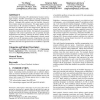Free Online Productivity Tools
i2Speak
i2Symbol
i2OCR
iTex2Img
iWeb2Print
iWeb2Shot
i2Type
iPdf2Split
iPdf2Merge
i2Bopomofo
i2Arabic
i2Style
i2Image
i2PDF
iLatex2Rtf
Sci2ools
122
click to vote
EUROSYS
2007
ACM
2007
ACM
Discrete control for safe execution of IT automation workflows
As information technology (IT) administration becomes increasingly complex, workflow technologies are gaining popularity for IT automation. Writing correct workflow programs is notoriously difficult. Although static analysis tools are available, fixing defects remains manual and error-prone. This paper applies discrete control theory to IT automation workflows. Discrete control detects flaws in workflows just as static analysis does, and more importantly it also allows safe execution of flawed workflows by dynamically avoiding run-time failures. Our approach can guarantee compliance with certain requirements and can partially decouple requirements from software, reducing the need to modify the latter if the former change. We have implemented a discrete control module for a real IT automation system. Experiments with workflows from a real production system and with randomly generated workflows show that our approach scales to workflows of practical size. Categories and Subject Descript...
Related Content
| Added | 16 Aug 2010 |
| Updated | 16 Aug 2010 |
| Type | Conference |
| Year | 2007 |
| Where | EUROSYS |
| Authors | Yin Wang, Terence Kelly, Stéphane Lafortune |
Comments (0)

